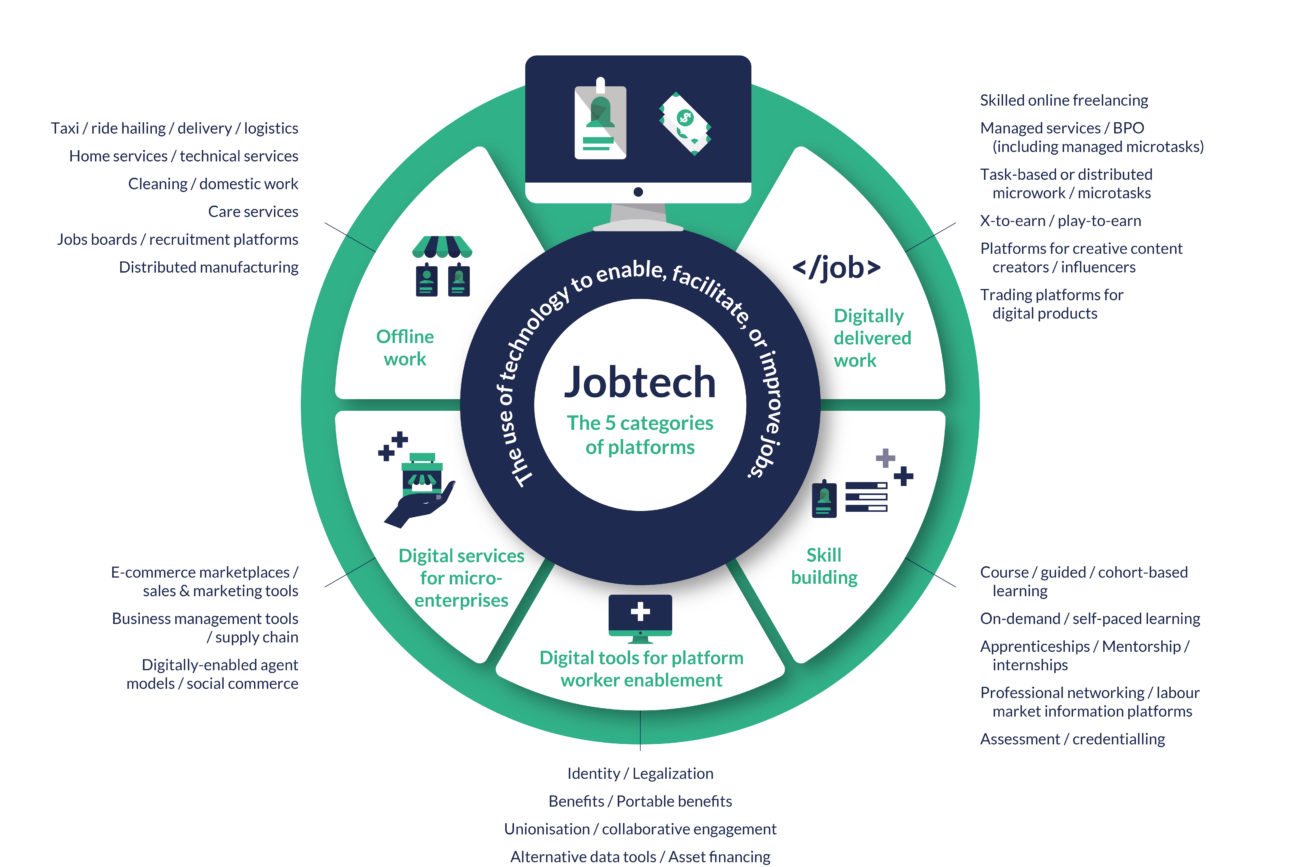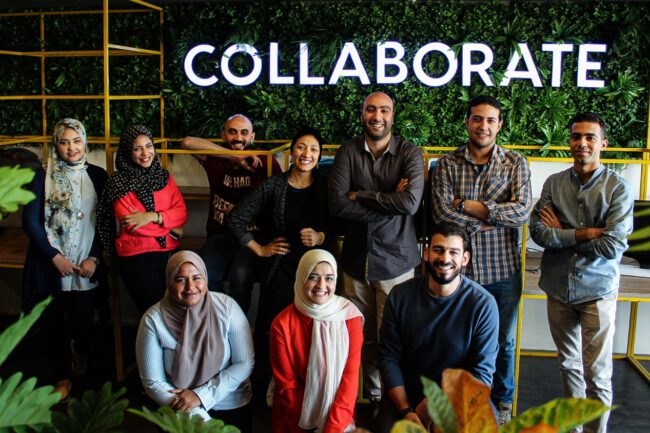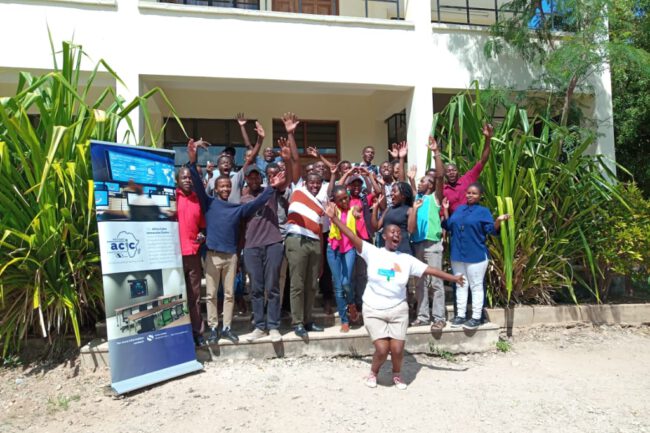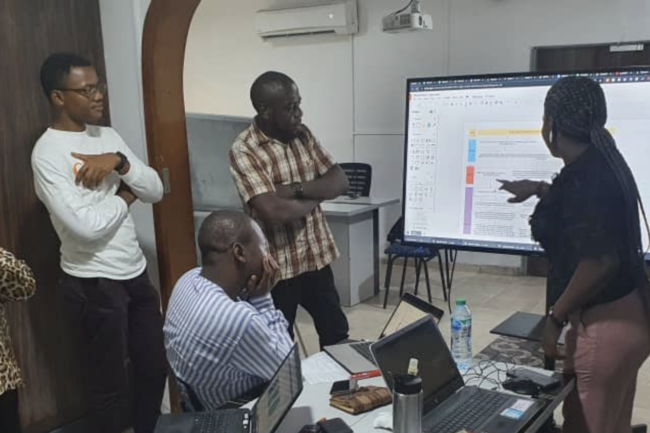Future of Work: Digitally-Enabled Jobs
In these unprecedented times of global challenges, the future stability of the working world appears to be under threat. With urbanization and environmental challenges directly affecting future generations, the question is how do we secure a sustainable future for businesses and their employees? Digitalisation and globalisation have sparked radical shifts in how we live and work. Recent events have accelerated these trends even further by spurring the fourth industrial revolution. It has increased the need for reshaping the world of work. In this revolution, almost all jobs will change. Digitally-enabled jobs provide a viable solution to combat these challenges and create decent jobs.
Digitally-Enabled Jobs
In the last decade, technology has proven to be one of the biggest disruptors to employment in developed markets.
The McKinsey Global Institute estimates that 540 million people worldwide will find work through digital platforms by 2025.
Therefore, when addressing the broader issue of the ‘Future of Work’, digitally-enabled jobs emerge as a pragmatic option to combat the complex challenges of climate change, poverty alleviation, and inequality reduction. It not only enables emerging economies to create decent jobs for today’s youth but also facilitates opportunities for the future labour force.
This can be better understood through the lens of ‘Jobtech’. It refers to the use of technology to enable, assist, or improve people’s ability to access and deliver quality work. It also has the greatest potential to drastically and inclusively enhance work for youth. We see a breadth of opportunities in the emerging ‘jobtech’ sector (see image below), which ranges from formal, and informal employment to small business management.
Technology has the potential to open up new professions and career paths that did not exist in the past and break down traditional barriers that prohibit access for young people, particularly women.
Planned Impact
Publications
Stay up to date with the latest articles and publications relating to how digitally-enabled jobs affect the future of work.
Our Portfolio in Jobtech Sector
Almost 70% of CFYE’s current portfolio comprises digitally-enabled jobs. See how some of our Implementing Partners are using this knowledge to create lasting change in the working world.
As a web and mobile-based digital platform, FUNDIS enables customers to source and hire skilled and vetted artisans. The platform frequently matches and connects workers to decent job opportunities, removing the inefficiencies that employers experience in finding and hiring workers in Africa.
Through its Academy, Jinni exhibits the possibilities within the jobtech sector by creating platforms for offline work. Upskilling the youth in Egypt employed in the informal market through job matching and gig matching, Jinni’s work aims to secure a higher level of stability within the sector.
Healthy Entrepreneurs, a social business based in Uganda and Kenya, have created an innovative solution to offer decent work for Community Health Workers. The e-platform provides supply chain, telehealth, and e-learning services to empower young workers and contribute to rural community healthcare.
Serianu provides tailor-made capacity building, certification, and placement programs to match and retain Kenyan youth in decent cybersecurity jobs. The youth participants are enrolled in skills-development programs that provide the necessary modern skills required for cybersecurity roles.
Combining tech, data, and a human approach, Shortlist is developing an enhanced method of accessing new talent. Through its global executive search and talent technological devices, Shortlist’s project will provide clear training and career progression to meet the demands within the Kenyan market.
Shujaaz’s national multimedia platform will recruit at least 10,000 young people to partake in digital trainings offered through their ‘MESH’ venture. By upskilling young Kenyan entrepreneurs to become Unilever retailers, Shujaaz enables their graduates to become highly proficient, digitally-enabled retailers.
Hugo creates a substantial space for Africa’s youth in the global digital economy. Through strategic contracting and partnerships with global technology companies, they create full-time, remote-work for Nigerians, in Nigeria. Such digitally-enabled jobs help to catalyse progressive working opportunities.
The DigitalMarketingSkill Institute equips youth with the technical skills needed to obtain decent jobs that fulfil both their personal and career aspirations in the new digital economy. The business model incorporates the “Income Sharing” principle to embody the values of decent work.
Novus Agro has created 100 GrainPoint outlets to administer entrepreneurial training for Nigerian youth. The digitization of this microenterprise will facilitate the expansion of their technical skill set. It will equip them to compete equally with youths from other areas of the world.
The Impact Acceleration Program is a 3-month mentorship-driven program that enables startups to surpass barriers and create sustainable solutions to societal and environmental issues. By delivering essential business development services, each startup has the capacity to deliver decent jobs for Sudanese youth.
Innovectives facilitates improvements in technological employment and skills development training opportunities for the youth of Nigeria. Through SME in a Box, they offer a range of digital financial services with an online and physical training academy to support the professional development of its workers.
Stutern empowers the youth in Nigeria by providing free tuition in engineering, product design, data science and product management until they are hired. The students receive practical experience while following the same technical and soft-skill workflow adhered to by the most successful tech companies.
IATL International Training Centre equips the youth in Sudan for decent and secure work in the digital sector. Through upskilling its members to obtain the technical expertise required to perform at international standards, IATL will create opportunities for decent quality career progression.
Factories Supporting Professions Project delivers a dynamic solution to address Jordan’s economic and cultural employment challenges. Through their eCommerce marketplace, training, and community sessions they will also address the barriers in place for women while fostering a positive mindset change.
Sprints utilizes skill-building technology to address the gap between the high demand for digitally-skilled young graduates and those qualified and trained to perform such roles. By bridging the tech talent gap, Sprints offers young graduates the opportunity to secure top-paying and empowering jobs in a growing market.















